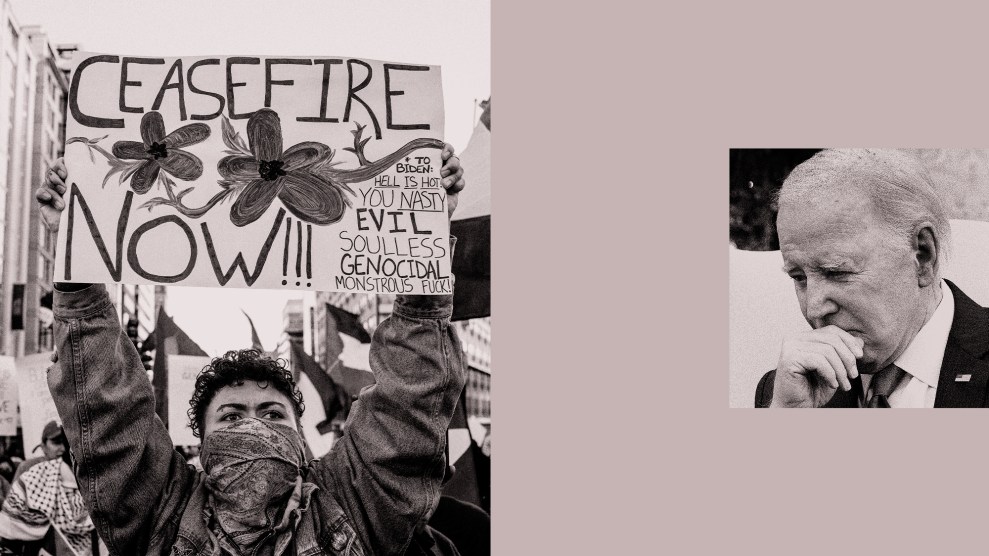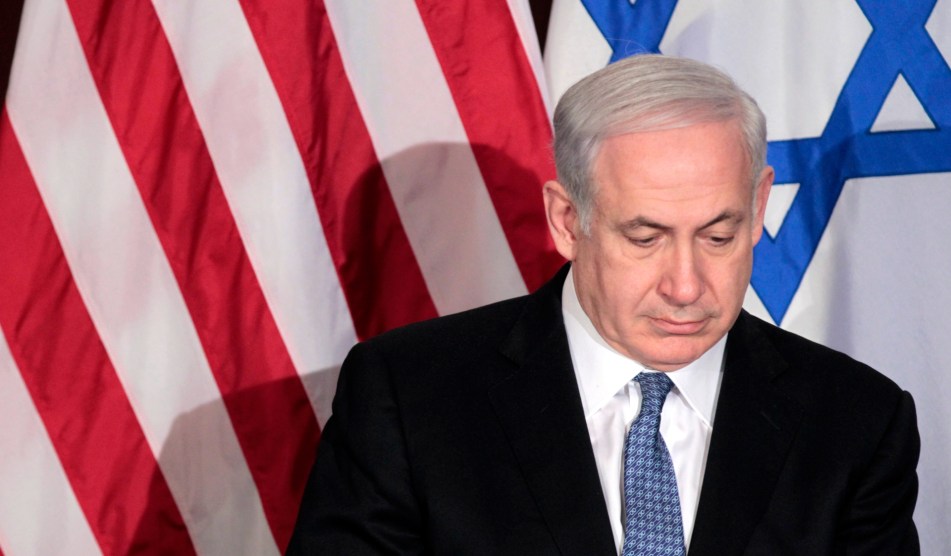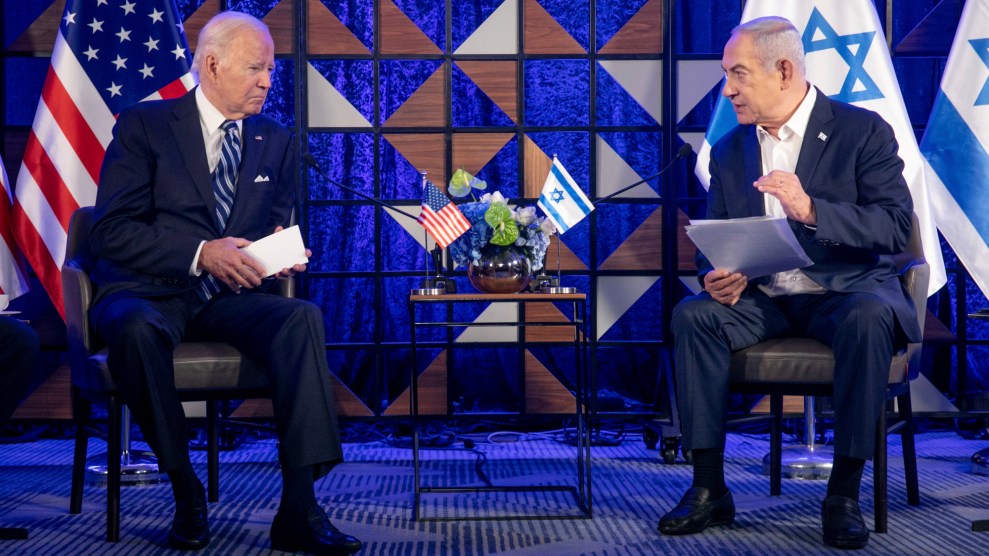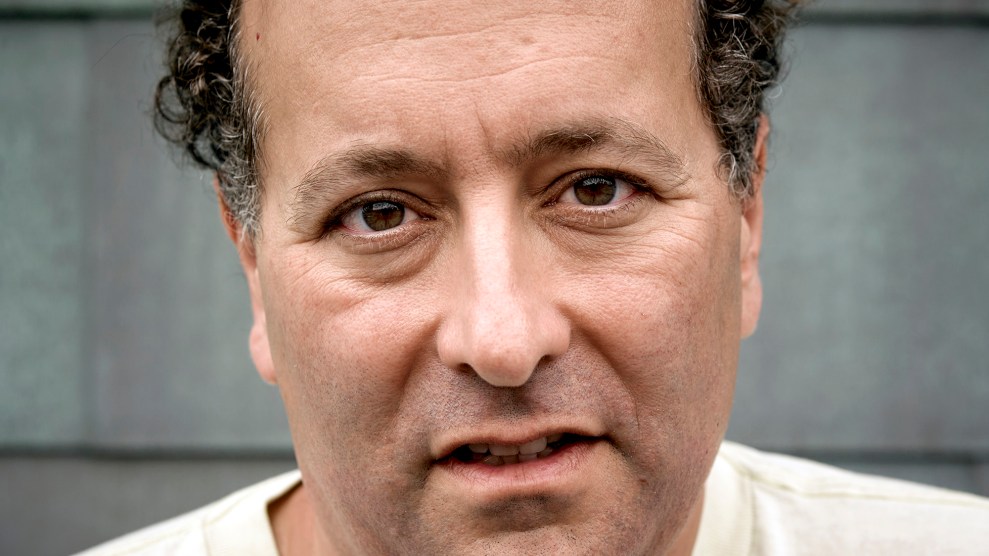
Former Secretary of State Hillary Clinton is confronted by protesters on Friday, Feb. 9, at a Columbia University event on sexual violence during armed conflict.Julianne McShane/Mother Jones
“You’re no feminist. You’re a white supremacist!”
That’s what a protester had to say to former Secretary of State Hillary Clinton on Friday at a Columbia University-hosted conference on conflict-related sexual violence, where dozens of demonstrators, including feminist scholars, showed up to criticize what they saw as an effort to justify the US’s support of Israel’s war in Gaza. They accused the event’s organizers of using reports of sexual assault by Hamas against Israeli women as a part of that strategy.
In a statement provided to Mother Jones, a spokesperson for Columbia’s Institute of Global Politics at the School of International and Public Affairs emphasized that the event—which also included discussion of sexual violence in places such as Ukraine, Sudan, and Congo—was not intended to focus solely on Israel and Palestine. “Today’s event was about bringing together officials and experts on horrific use of sexual violence in conflicts around the world—and giving voice to those impacted wherever and whenever it occurs,” the spokesperson said.
The event, which attracted heavyweights like UN Ambassador Linda Thomas-Greenfield and former Facebook executive Sheryl Sandberg, comes amid a fact-finding mission on the reports of sexual violence during Hamas’ Oct. 7 attacks. The UN launched the probe in late January, in response to critiques that the international body had been ignoring the allegations against Hamas. In the meantime, critics of Israel’s actions in Gaza—which have killed more than 27,000 people, many of them children, per the latest UN figures—claim Israel and its supporters have used the rape narrative to justify an overzealous response.
Clinton has opposed calls for a Gaza ceasefire, writing in the Atlantic in November that a ceasefire “would give Hamas a chance to re-arm and perpetuate the cycle of violence” and “would leave the people of Gaza living in a besieged enclave under the domination of terrorists and leave Israelis vulnerable to continued attacks.” But in an MSNBC appearance this week, Clinton called for Prime Minister Benjamin Netanyahu’s ouster and said American officials “wish there was a ceasefire. If Hamas would agree to a ceasefire, there would be a ceasefire,” according to the Times of Israel.
At Friday’s event, Clinton tried to calm her protesters. “Yelling doesn’t solve anything,” she told one of the first to disrupt the proceedings. “Hillary, you should be ashamed for exploiting sexual violence for your own political gain!” another protester yelled.
“Alright, we’re gonna stop, we’re gonna stop a minute,” Clinton replied, as organizers approached the protester.
“You’ve done this before…You exploited sexual violence in Libya so you could justify US militarization,” the protester continued. “If you were enraged about sexual violence, you’d be talking about the sexual violence in Palestine and the sexual violence that they endure daily.”
“You know what,” Clinton said, cutting the protester off, “Why don’t you all of you just interrupt me so you won’t be interrupting our panelists so we don’t have this kind of disruption when we have people who are real experts in this area.”
“People are free to protest, but they’re not free to disrupt events or classes,” she added.
I’m at a conference on sexual violence in conflict at Columbia University for @MotherJones, where @HillaryClinton has so far been interrupted by 3 protesters alleging she’s “exploiting sexual violence” to justify the war in Gaza pic.twitter.com/beZayPrPgY
— Julianne McShane (@JulianneMcShane) February 9, 2024
When Thomas-Greenfield spoke next, protesters also interrupted her—and called for attendees to walk out. About a quarter did, chanting, “Free, free Palestine” as they moved to block the entrance before eventually filing out.
Thomas-Greenfield tried to quell the criticism: “Please be assured that there is no issue that is related to sexual violence—violence anywhere in the world—that we’re not concerned about and not working on every single day,” she said to applause.
Sandberg—who was seated in the second row, behind Clinton, and said she had just returned from Israel to film a documentary on alleged sexual violence on Oct. 7—turned to stare at the departing protesters, looking shaken. Later, while moderating a panel, she said, “I feel so strongly that no matter the politics of the situation, rape can never be overlooked, because that would set such a dangerous precedent for people all over the world.”
The Columbia event came about two weeks after the UN announced that the Special Representative of the Secretary-General on Sexual Violence in Conflict, Pramilla Patten, had accepted an invitation from the Israeli government to come “gather information” on the sexual violence allegedly perpetrated by Hamas on Oct. 7. Patten would also visit the occupied West Bank and meet with Palestinian authorities, the UN said, and brief journalists on her findings—the briefing probably won’t occur until the end of this month, a spokesperson told Mother Jones.
About a month before the conference, the New York Times published an investigation into the sexual violence allegations that it said was based on more than 150 interviews. The story drew criticism from inside the Times and also from readers who pointed to discrepancies in some of the accounts the story was based on, according to the Intercept. The Times writers addressed some of the critiques in a recent follow-up story. (From the start of the conflict in October, a Times spokesperson said in a statement, its journalists “have reported with sensitivity, independence and unflinching detail on destructive events that have generated strong reactions.”)
Jeffrey Gettleman, lead author on the Times investigation, also appeared at the event, on a panel with Sandberg. He attempted at one point to fend off criticism of his team’s reporting, saying he was “not trying to pass judgment, not trying to get involved in a very intractable, difficult, long-standing conflict—that’s not my job. I was trying to document what happened on Oct. 7 to women and girls, and that was our story.”
The protests began before the event even did.
Outside, I met a group of protesters carrying signs that said, “Real feminists don’t massacre Palestinian women!!” and “Stop funding genocide.” (Pregnant Palestinians have reportedly been miscarrying and struggling to access care amid Israeli airstrikes, as my colleagues and I have reported, and Palestinians more broadly are facing a severe humanitarian crisis, with little access to food, fuel, and medical care.)
An organizer handed me a flier depicting the Columbia event as “an example of colonial feminism” that reinforces tropes about Palestinian men as rapists while ignoring sexual violence against Palestinians. (Scholars and journalists have documented Palestinian men’s and women’s experiences of sexual violence while detained by Israeli forces, and sexual harassment of Palestinian women at Israeli checkpoints. In 2017, meanwhile, a UN Women report found that about 15 percent of married Gazan women had reported sexual abuse by their husbands in the previous year—repeatedly, in more than half of the cases.)
At the building’s entrance, a couple of protesters were handing out copies of what they called “The New York War Times,” which critiqued Gettleman’s story. A police officer pointed me toward two women by the elevators who he said could check me into the event. It turned out they were part of a group of feminist scholars, including some Columbia and Barnard faculty members, who were there to protest. Rebecca Jordan-Young, a professor of women’s, gender and sexuality studies at Barnard, handed me a letter signed by dozens of fellow scholars and writers—including the likes of Angela Davis, Beverly Sheftall, and Chandra Talpede Mohanty—objecting to “the Israeli and US governments and others weaponizing the issue of rape.”
The letter, which, in addition to condemning rape, supported the UN investigation into allegations of sexual violence by both sides and called for a ceasefire, said it ultimately would be delivered to Israeli and American officials.
Jordan-Young, who was among the signatories, called the “framing and timing” of the event “opportunistic” given the US government’s backing of Israel in the war. “Every rape is an outrage, as is the carpet-bombing of civilians,” she told me. “As a feminist scholar, I’m all too aware that both rape and charges of rape have been and continue to be used in the service of racism.” Simply looking at sexual or gender violence in isolation, she added, “can’t generate a sound analysis or sound politics.”
Arianna Coghill contributed to this story.
Update, February 10: This post has been updated to include a statement from a Columbia spokesperson.















